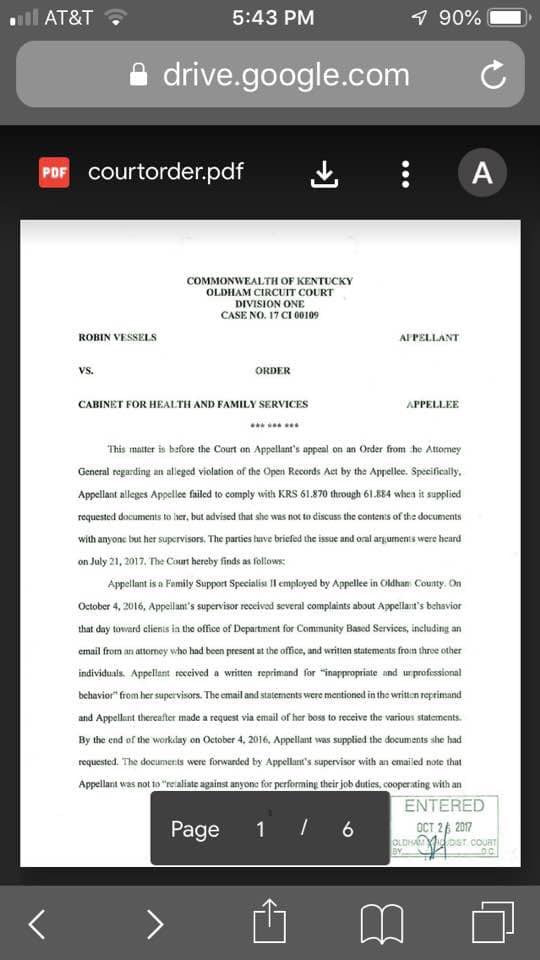
Not long after I left the attorney general's office, I was contacted by an employee of the Cabinet for Health and Family Services.
Robin Vessels had requested records relating to disciplinary measures taken by the Cabinet against her.
In uncharacteristic haste, the Cabinet had released the records to Vessels on the same day along with a written admonition that she "should not discuss it [sic], in any form or fashion, outside of her supervisors."
She was later subjected to additional disciplinary measures for discussing the records with a witness to the incident for which she was originally disciplined.
Vessels appealed the Cabinet's order not to discuss the records with anyone outside her chain of command to the Kentucky attorney general. She argued that the Cabinet subverted the intent of the open records law, short of denying her access, by placing restrictions on her "secondary" use of the records.
Ignoring at least four prior opinions/decisions addressing this question, the attorney general issued a decision affirming the Cabinet's actions.
The attorney general characterized those actions as "workplace restrictions" rather than restriction on the use of nonexempt public records.
(As the public employee to whom the records related, Vessels had an absolute right of access to the records under state personnel law as well as the open records law, but because the Cabinet had taken final disciplinary action against her, the public also had a right to see the records that formed the basis of the decision to discipline her).
The open records decision issued by the attorney general — 17-ORD-007 — conflicted with previous opinions/decisions issued by his office, but the attorney general did not overrule or distinguish those authorities.
https://ag.ky.gov/orom/2017/17ORD007.doc
Vessels took the matter one step further, appealing 17-ORD-007 to the Oldham Circuit Court. Armed with the previous attorney general authorities supporting her position, she prevailed.
The Oldham Circuit Court determined that the Cabinet for Health and Family Services subverted the intent of the open records law and that it's order was "clearly meant to have a chilling effect on how [she] could use the product of her open records request."
Judge Karen Conrad found particularly persuasive the earlier legal authorities issued by the office of the attorney general that conflicted with the decision his office issued in Vessels' appeal. Those authorities recognize that an agency cannot "prescribe the uses to which nonexempt public records requested for a noncommercial can be put."
For any open records requester who might find him or herself in the same situation, the authorities are OAG 93-19, 04-ORD-113, 95-ORD-77, and 14-ORD-170.
https://ag.ky.gov/government/opinions/Opinions%20New/OAG93-019.htm
https://ag.ky.gov/orom/20041/04ORD113.doc
https://ag.ky.gov/orom/19951/95ORD077.htm
https://ag.ky.gov/orom/20141/14ORD170.doc
With the exception of commercial open records requesters, whose use of records is limited to the commercial purpose they certify, and requesters who obtain copies of mugshots(!), an open records requester may use records obtained under the law for any lawful purpose.
This is another example of public agency overreach in the context of an open records dispute. Armed with the appropriate legal authorities, an open records requester — who is told not to make public records public — should, like Robin Vessels, prevail.


